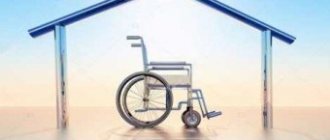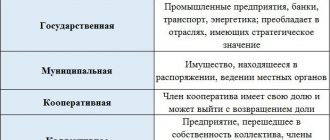The following two tabs change content below.
- Author
- Author's articles
Angelika Senkina (Lawyer)
6 years of experience.
Author: Angelika Senkina (Lawyer) (All articles by the author)
- Collection of alimony for the past period - 04/16/2020
- In what cases is the employer obliged to compensate the employee for the earnings he did not receive? — 04/06/2020
- Alimony for a pregnant wife in marriage - 03/18/2020
According to the law, a person with disabilities has the right to a comfortable home with special means and devices in accordance with an individual rehabilitation program. Families of citizens who are unable to engage in work for health reasons also have the right to expand their property holdings. We will figure out how to get housing for disabled people and study in detail the procedure for obtaining benefits.
Conditions for obtaining disability status
According to Decree No. 95 of the Russian Federation, there are 3 groups of disabilities, which differ in the severity of the pathology. A citizen can be assigned a disability group if:
- serious disorders occur in his body (that is, people with disabilities since childhood or a group acquired as a result of injury or a severe pathological condition);
- he requires social protection with a rehabilitation focus;
- he developed a limitation of vital activities (that is, he completely or partially stopped moving and caring for himself independently).
Important! Only specialists of special medical examination can recognize a person as disabled. A referral for examination can be obtained from a therapist, the Pension Fund of Russia or the social security department.
After receiving disability status, citizens can apply for government privileges. This also includes the provision of apartments to disabled people without their own property.
State privileges for disabled people
Persons with disabilities are protected by the Federal Law “On Social Protection of Persons with Disabilities”. According to it, citizens can:
- get free living space;
- apply for housing subsidies to compensate for part of the purchased square meters;
- receive discounts on utility bills;
- apply for a plot of land for individual housing construction for gardening.
State privileges apply based on the Federal Law, which describes the procedure for providing an apartment.
Accessible urban environment
When and how do organizations adapt to the needs of people with disabilities?
The law states that a facility can be fully equipped during a major overhaul or reconstruction - unless, of course, this has not already been done and it was built before these rules came into force. What to do if repairs or reconstruction are not expected in the near future?
An organization or store that does not comply with the rules and cannot provide full access to its services for people with disabilities must act in coordination with one of the local public associations for people with disabilities. Together they develop measures and provide conditions for access for people with disabilities to the place of service provision. If this cannot be organized in any way, the disabled person should be provided with the service remotely at their place of residence.
And new city facilities can be built only if the plan includes in advance design features that provide access for people with disabilities.
Parking spaces
The law also provides special parking spaces for disabled people. In all public parking lots, including those located near socially significant facilities, at least 10% of the spaces are allocated for free parking for cars driven by disabled people. Other car owners are not allowed to occupy these spaces with their cars.
Recommendations for ensuring the comfort of people with limited mobility in catering establishments
The same requirements apply to restaurants and cafes. They must ensure unhindered access for people with disabilities. The measures are assumed to be standard: ramps, handrails, equipped toilets, the ability to use tables, and so on.
Under what circumstances can I get housing?
There are a certain number of conditions according to which a person with a group due to health conditions will be able to receive a property area:
- A person with disabilities and his family live in apartments that do not meet the standards when calculating the area of the premises for each family member.
- The apartments do not meet technical and sanitary standards.
- The apartment for a wheelchair user is located above the 2nd floor.
- The family lives in the same territory with strangers, not related to them but not related to them.
- A person with a disability group lives in the same apartment with another family who is supporting a patient in a serious pathological condition and with whom it is impossible to be on the same territory.
- A person with a certain health group lives in a communal apartment or dormitory.
- Accommodation is carried out under a rental or sublease agreement.
A comment
1. Providing housing less than the specified norm does not mean solving the housing problems of citizens and gives citizens the right to remain on the housing register. In practice, there are often cases when citizens are removed from the housing register after they have been provided with housing of less than the required area. In such cases, it is necessary to go to court to restore registration. See the appeal ruling of the Moscow City Court dated February 14, 2014 in case No. 33-1930: The demands to invalidate the order to remove from the housing register and reinstate those in need of improved housing conditions were legally satisfied, since the plaintiff’s family was provided with residential premises that did not comply provision norm established by law.
2. When providing housing, the total area of RESIDENTIAL premises must be taken into account, in addition, these premises must actually occupied by registered citizens. Otherwise, they cannot be deregistered. See the appeal ruling of the Moscow City Court dated May 26, 2014 in case No. 33-13157: The claim to declare illegal the actions to provide residential premises that do not meet the requirements set by law for the size of residential premises established for a family was legally satisfied, since persons for living quarters the area was not occupied, the rights to use the residential premises were not acquired, that is, they do not have independent rights to the apartment., and also see the Appeal ruling of the Moscow City Court dated 04/02/2014 in case No. 33-9982: Claims for the cancellation of the order to remove from the housing registration and the obligation to restore the registration were satisfied lawfully, since it was established that the defendant, when calculating the size of the living area attributable to each member of the applicant’s family, unreasonably included a non-residential building in this area.
3. It is important to take into account that when determining the area, it is necessary to take into account only the area of the residential premises, which does not include, say, the areas of the common corridors of an apartment building, residential building, etc. see Appeal ruling of the Moscow City Court dated April 16, 2014 in case No. 33-12665: The application for restoration on the register of those in need of assistance in the city of Moscow in purchasing residential premises within the framework of city housing programs was granted legally, since the real estate owned by the plaintiff is not a residential building, but a residential building, and therefore the plaintiff’s family is provided with living space less than the established accounting norm.
4. When determining the level of provision of applicants with the total area of living quarters, the area of the applicants’ spouses, who are not on the housing register as members of the applicants’ family, should not be taken into account. This conclusion follows from the content of the norms of paragraph 2 and paragraph 4 of Art. 20 of Moscow Law No. 29, according to which residential premises in the manner prescribed by this law are provided only to those persons who are on the housing register. At the same time, when providing residential premises, the provision of living space with the living space is taken into account only for those persons who are on the housing register, and the provision with the living space of those members of their families who are not on the housing register is not taken into account. This point of view has been sufficiently reflected in judicial practice, in particular - the Appeal ruling of the Moscow City Court dated 04/04/2013 in case No. 11-7072: When providing residential premises, the provision of living space with living space is taken into account only for those persons who are on the housing register, and not the provision of living space for those members of their families who are not on the housing register is taken into account. The appeal ruling of the Moscow City Court dated April 30, 2013 in case No. 11-17945: The request to declare illegal the order to remove from the housing register was satisfied” lawfully, since residential premises owned by the plaintiff are not subject to consideration when calculating the norm for the provision of living space and resolving the issue of removing a family from the register of those in need of improved housing conditions. The appeal ruling of the Moscow City Court dated May 14, 2013 in case No. 11-12377: The claim to invalidate the act of removing a family from the housing register was legally satisfied, since the conclusion that the family is provided for according to the standard of provision and its living conditions have changed, as a result which no longer provides grounds for the provision of residential premises, is not based on the law.
5. In accordance with clause 5 of the Decree of the Government of the Russian Federation of October 15, 2005 N 614 “On approval of the Rules for the provision of subventions from the federal budget to the budgets of the constituent entities of the Russian Federation for the implementation of the transferred powers of the Russian Federation to provide housing for veterans, disabled people and families with disabled children” , the form and procedure for providing citizens with social support measures for housing are established by state authorities of the constituent entities of the Russian Federation. In Moscow, there is an Order of the Department of Housing Policy and Housing Fund of Moscow dated February 22, 2008 N 456 “On the procedure for recording specially equipped residential premises of the specialized housing fund of Moscow and their provision to citizens with musculoskeletal disorders, using wheelchairs, consisting on housing registration", according to which: Disabled people and families with disabled children, as well as disabled people living in inpatient social service institutions and disabled children with impaired musculoskeletal function who use wheelchairs, are accepted for housing registration and are provided with housing premises taking into account the individual rehabilitation program for a disabled person, including specially equipped ones, in the manner established by the laws of the city of Moscow, taking into account the benefits provided for by the legislation of the Russian Federation and legal acts of the city of Moscow. Residential premises from the specialized housing stock of the city of Moscow are provided to a wheelchair user and members of his family included in the agreement for the use of residential premises, with their removal from the housing register. At the same time, other family members of a wheelchair user who were registered with him in the housing register within the same registration file: - are removed from the housing register if, after providing the wheelchair user with specially equipped living quarters, each of them has 18 square meters. m or more of living space (in this case, residential space provided to a wheelchair user is not taken into account); - remain on the housing register if, after providing a wheelchair user with specially equipped living quarters, each of them has less than 18 square meters. m of living space (in this case, living space provided to a wheelchair user is not taken into account). Residential premises provided to citizens in accordance with an individual rehabilitation program for a disabled person may be equipped with special means and devices. Specially equipped residential premises in the form of a separate apartment are included in the specialized housing stock of the city of Moscow and are provided to citizens using wheelchairs under contracts for free use, taking into account their state of health, marital status and other noteworthy circumstances, including the grounds giving the right for the provision of additional space due to health reasons. See also commentary to Art. 8 of the Law and Art. 18 of the Law.
What do you need to do to register?
First you need to get in line to receive housing or expand the area of your apartment. To do this, you need to collect documents and attach them to the application.
From the social security department you should obtain a sample application order to provide a person with disabilities with living space. After which the application is filled out and the following documents are attached:
- a copy of your personal bank account;
- extract from the house register;
- certificate confirming the disability group;
- personal rehabilitation document.
You will also need to attach medical papers describing the reasons for obtaining the appropriate status and the results of medical examinations.
Step-by-step steps to obtain housing for people with disabilities
The year 2005 was a turning point, because it was during this period that the division began between those citizens who registered before January 1, 2005, and those who registered after that date.
People with a certain health group who joined the waiting list before 2005 receive the right to live in apartments under a social tenancy agreement in order of priority. For these citizens, the legislation provides subsidies to pay for part of the property upon purchase. But, despite this, basically such privileges go only to disabled veterans of the Patriotic War.
Everyone who registered after 2005 falls under the category of preferential citizens. They will be able to receive square meters on an equal basis with other beneficiaries.
The state has also provided for situations where citizens can apply for apartments out of turn. This group includes minor children living in shelters or left without the care of their mother and father.
In addition to the main housing, persons with disabilities can receive additional property space. This is possible if the disabled person:
- HIV positive;
- has psoriasis on the body;
- suffers from open tuberculosis;
- has some disorders in the genitourinary system;
- has a disorder of the musculoskeletal system (absence of legs, which prevents independent movement).
The Constitutional Court clarified the procedure for providing housing to incapacitated citizens
On February 1, the Constitutional Court issued Resolution No. 3-P in the case of verifying the constitutionality of clause 3, part 2, art. 57 of the Housing Code and Part 3 of Art. 17 of the Law on social protection of disabled people in the Russian Federation. According to the first norm, residential premises under social tenancy agreements are provided out of turn to citizens suffering from severe forms of a number of chronic diseases. Based on the second norm, disabled people and families with disabled children in need of improved housing conditions and registered after January 1, 2005 are provided with housing in accordance with the housing legislation of the Russian Federation.
Refusal to provide a disabled person with housing with increased space for her guardians to live with her
As follows from the case materials, K., a resident of Astrakhan, has been disabled in group I in terms of vision since childhood and needs constant outside care. In addition, she suffers from a severe form of chronic disease, which makes it impossible for citizens to live together in the same apartment. In 2011, K. was declared legally incompetent, and in 2012, her mother, citizen G., was appointed guardian.
Since 2012, G., her husband V. and daughter K. (a family of three) have been registered as needing housing provided under a social rental agreement from the municipal housing stock. At the same time, K. is also included in the list of persons suffering from severe forms of chronic diseases and registered as needing residential premises.
In August 2013, the court granted the prosecutor's claim filed in the interests of the family, obliging the Astrakhan administration to provide it with comfortable housing out of turn under a social rental agreement, taking into account the additional living space provided for people with disabilities. Nevertheless, the appeal overturned the decision and issued a new judicial act, according to which the administration is obliged to provide comfortable residential premises under a social tenancy agreement only to K. as a person suffering from a severe form of a chronic disease specified in clause 4 of part 1 of Art. 51 Housing Code list.
Disability groups
With the help of a special medical examination, you can easily establish a disability group. It will depend on the severity of the pathological condition.
1st disability group
Disabled people of the 1st group include people with mental, speech and language disorders. This also includes citizens with serious sensory impairment and motor coordination.
As we said above, if a disabled person was registered before January 1, 2005, then he will receive funds for the purchase of apartments from the regional fund. If the application was submitted after the stated date, then a disabled person will be able to get an apartment on a first-come, first-served basis.
What can disabled people of group 2 qualify for?
Disabled people of the 2nd group are recognized as having limited ability to work. But this does not prevent them from applying for special living conditions, which means taking advantage of government benefits. Those in need in this category receive living space on the basis of a social tenancy agreement.
Attention! Single disabled people are also provided with apartments, but on the condition that he can independently serve himself without the help of third parties.
- Firstly, the apartment must have facilities to make life easier for a disabled person.
- Secondly, the area of the apartment must meet generally accepted standards.
- Thirdly, when designing an apartment building, the characteristics of future residents must be taken into account, which is why ramps and elevators are installed.
If a person with disabilities needs to go to a nursing home, then his living space remains assigned to him for 6 months. If his family remains there, then after any period of time no one will move into the apartment.
3rd disability group
Disabled people of the 3rd group include both working and disabled citizens. Only a medical labor examination can assess the ability of a person with disabilities to work. If a person has received the status of “disabled”, but continues to work in accordance with the Labor Code of the Russian Federation, then he will not be able to get new housing. Only disabled citizens can apply for such a benefit.
What are organizations required to do?
In accordance with the law, organizations and authorities are obliged to provide disabled people with:
- Conditions for unimpeded access to social, engineering and transport infrastructure facilities.
Such objects are considered to be residential, public and industrial buildings, structures and structures, including those in which physical education and sports organizations, cultural organizations and other organizations are located.
There must be unimpeded access to recreational facilities and the services provided in them.
All these facilities must be equipped with ramps, handrails, toilets for the disabled (if toilets are proposed in principle); must have passages wide enough to allow wheelchair access.
- Conditions for unhindered use of transport
For example, public transport must have special areas for wheelchairs, equipped with handrails and driver call buttons. A bus or electric bus is equipped with a special ramp for entry and exit; some models can “lean” towards the curb so that there is no large gap left.
This also includes the availability of means of communication and information (including means that provide sound signals for duplicating light signals of traffic lights and devices regulating the movement of pedestrians through transport communications).
Stations should have ramps and passenger-and-freight elevators; places for wheelchair users in waiting rooms; special tables in buffets, cafes and restaurants; toilets equipped for the disabled. To board the carriage, mobile lifts must be provided to move from the platform to the carriage. Passages in compartments equipped for disabled people must be wider than standard ones.
A whole set of requirements exists for carriages intended for travel by disabled people. For people with disabilities, special compartments are provided, equipped in such a way that they can travel comfortably (including the possibility of the presence of an accompanying person). The compartment is equipped with special swivel and reclining chairs, handrails, as well as additional intercoms for emergency communication with the conductor. For the visually impaired and blind, special means of information and communication are installed, duplicating information messages in the carriage by voice, and inscriptions are placed in relief technology.
Similar requirements apply for other modes of transport.
- The ability to independently move around the territory, enter and exit, get into and out of a vehicle, including using a wheelchair.
That is, ramps, wide passages, special toilets, handrails must be throughout the entire territory. When visiting an organization, a person with a disability should be able to get by without additional assistance.
- Accompanying disabled people with persistent impairments of vision and independent movement, providing them with assistance.
For those who experience vision problems, there are additional conditions, because it is difficult to provide them with complete independence in an unfamiliar space. It is worth finding out in advance how support is provided. It may be necessary to inform about the proposed visit so that the assistant is already ready.
- Admission to social, engineering and transport infrastructure facilities for a guide dog with a document confirming its special training.
For example, pets are not allowed in grocery stores. The ban is dictated by sanitary standards. But an exception must be made for guide dogs, since without a dog a visually impaired or blind person will not be able to make purchases.
Important!
If questions arise, it will be necessary to show documents that will confirm that the dog is actually trained to be a guide and acts in this role (and is not an ordinary pet).
A guide dog must be allowed on the train with its owner without any reservations or additional documents.
Where should I go to appeal the refusal?
If you receive a refusal to place a disabled person on the waiting list for an apartment, you can go to court and appeal the decision. But you will have to pay a fee to file a claim. The claim must be filed no later than 30 days from the date of receipt of the refusal paper. It is advisable to record communications with municipal employees so that there is evidence in court. Although people with disabilities are an unprotected category of citizens, they can still achieve justice in court.
Your rating of the article








